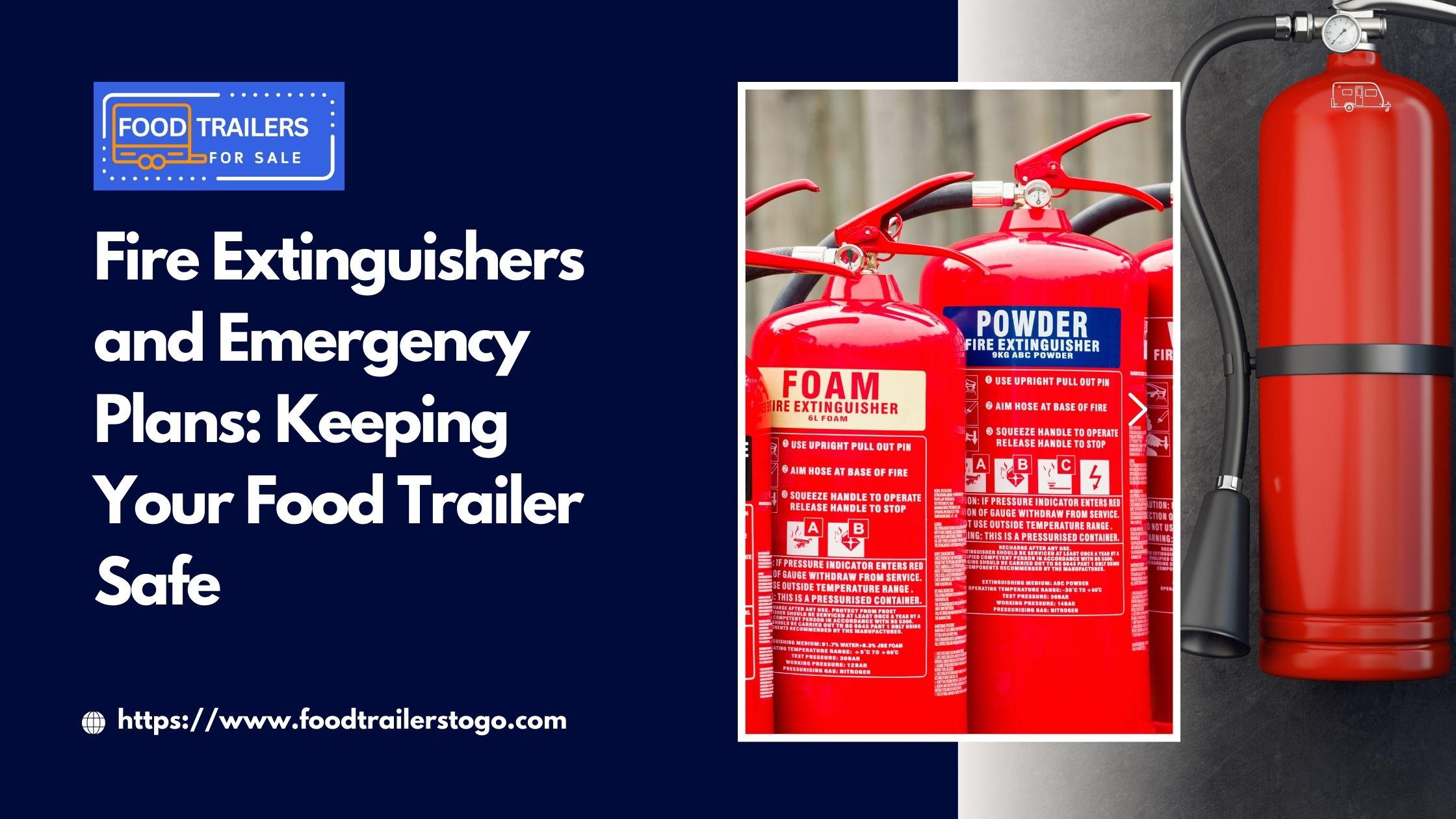Operating a food trailer offers unmatched freedom and creativity. Whether you’re serving up delicious street food, gourmet dishes, or fresh beverages, your food trailer can be the heart of your business. However, with this mobility and flexibility comes responsibility—particularly when it comes to safety. One of the most important aspects of ensuring the safety of your food trailer, your team, and your customers is having a solid fire extinguisher system and an emergency plan in place.
At Food Trailers to Go, we understand the importance of maintaining a safe working environment for your food trailer. We specialize in designing custom food trailers and food trucks, ensuring that your equipment is not only high-quality but also equipped with the necessary fire protection systems. This article delves into why fire extinguishers and emergency plans are essential for keeping your food trailer safe in any situation and how you can implement them effectively.
The Importance of Fire Extinguishers in Your Food Trailer
Fires are an ever-present risk in any kitchen, and the fast-paced, high-heat environment of a food trailer is no exception. Having an accessible, reliable fire extinguisher system in place is essential to protect your food trailer and personnel from disaster.
Here’s why fire extinguishers are critical:
- Prevention of Small Fires from Escalating: A small kitchen fire can quickly become catastrophic if not extinguished immediately. Having a fire extinguisher close by allows you to tackle the flames before they spread, minimizing damage to your trailer and equipment.
- Protection Against Different Fire Types: Fires in a food trailer can arise from various sources, including grease, electrical faults, and gas leaks. Different fire extinguishers are suited for different types of fires. A well-equipped food trailer should have Class K fire extinguishers for grease fires and Class ABC fire extinguishers for other common kitchen fires.
- Compliance with Safety Regulations: In many jurisdictions, having the proper fire extinguishers in place is a legal requirement for mobile food units. Ensuring compliance with local safety standards helps avoid fines and operational delays.
Fire Extinguisher Checklist for Your Food Trailer
- Type: Ensure you have the right type of fire extinguisher based on your cooking equipment.
- Location: Place fire extinguishers in easily accessible areas, especially near cooking stations and gas lines.
- Inspection: Regularly check your extinguishers to ensure they are in working condition. It’s recommended to have them inspected at least once a year by a professional.
Creating an Emergency Plan: A Step Toward Safety
A fire extinguisher alone cannot guarantee your food trailer’s safety in an emergency. You must also have a well-thought-out emergency plan in place. This plan should outline clear steps to take in the event of a fire or other safety incidents. It ensures that you and your team can react quickly and appropriately, minimizing risks and protecting everyone involved.
An effective emergency plan should include:
- Clear Evacuation Routes: Identify and mark evacuation routes that are free of obstacles, ensuring that everyone knows how to exit safely in the event of a fire or emergency.
- Training for Staff: Regularly train your team on how to use fire extinguishers, identify potential fire hazards, and act quickly in case of a fire. Emergency drills should be conducted to ensure preparedness.
- First Aid Kits: Always have a well-stocked first aid kit in your trailer. In case of burns or other injuries, having the necessary supplies on hand can make a significant difference.
- Contact Information for Emergency Services: Keep emergency contact numbers, such as the local fire department and medical services, in a visible and easily accessible location.
Emergency Plan Checklist for Food Trailers:
- Evacuation plan: Clearly marked exits and routes.
- Fire drills: Regularly practice emergency situations.
- First aid readiness: Accessible and stocked first aid kits.
- Emergency contacts: Easily visible contact information for fire and medical services.
Fire Safety Features to Include in Your Food Trailer
While fire extinguishers and emergency plans are essential, you can also integrate additional safety features into your food trailer to prevent fires and ensure the safety of your team. These features work in conjunction with your emergency plans to create a comprehensive safety system.
Some safety features to consider are:
- Automatic Fire Suppression Systems: These systems are designed to automatically detect fires in areas with high heat and immediately suppress them. Installing an automatic fire suppression system, especially over cooking equipment, can significantly reduce the risk of a major fire.
- Smoke Detectors: Smoke detectors are crucial for early fire detection. Integrating smoke alarms into your food trailer’s ventilation system will provide early warnings, giving you time to react before the situation worsens.
- Gas Leak Detectors: Given that many food trailers operate using gas-powered cooking appliances, gas leak detectors are a vital safety measure. These detectors will alert you to any gas leaks that could potentially lead to an explosion or fire.
Safety Features Table:
| Safety Feature | Function | Why You Need It |
|---|---|---|
| Automatic Fire Suppression System | Automatically detects and suppresses fires | Prevents fires from escalating |
| Smoke Detectors | Detects smoke and triggers an alarm | Provides early warning for fire emergencies |
| Gas Leak Detectors | Senses gas leaks and alerts the team | Prevents potential explosions or fires |
| Fire Extinguishers | Allows for quick suppression of fires | Essential for fighting different fire types |
How to Choose the Right Fire Extinguisher for Your Food Trailer
Choosing the right fire extinguisher is vital to ensure that your food trailer is adequately protected. Different types of fires require different types of extinguishers, so it’s important to know which one suits your specific needs.
- Class A: For ordinary combustibles like wood, paper, or cloth.
- Class B: For flammable liquids like oils and grease.
- Class C: For electrical fires.
- Class K: Specifically designed for cooking oils, such as those used in deep fryers.
It is recommended that you have a Class K fire extinguisher in your trailer, especially if you use deep fryers or other cooking equipment that may involve cooking oils.
Choosing the Right Fire Extinguisher Based on Your Equipment
- Gas Stoves: Class B or C fire extinguishers are ideal.
- Deep Fryers: Class K fire extinguishers are best for grease fires.
- General Cooking Equipment: A Class ABC fire extinguisher covers a wide range of fire types.
FAQs About Fire Extinguishers and Emergency Plans
1. How often should I check my fire extinguisher?
It is recommended that you check your fire extinguisher monthly to ensure it is fully charged and functional. A professional inspection should be conducted annually.
2. What should I do if I don’t know how to use a fire extinguisher?
Make sure to train all staff members on the correct use of fire extinguishers. Regular fire safety training is essential to ensure everyone knows how to act in an emergency.
3. Can I install fire suppression systems myself?
No, fire suppression systems should always be installed by a certified professional to ensure they are compliant with safety regulations and work correctly in an emergency.
4. Do I need multiple fire extinguishers in my food trailer?
Yes, it’s best to have at least two fire extinguishers in a food trailer, especially near cooking equipment and gas lines.
5. What should I include in my food trailer’s emergency plan?
Your emergency plan should include evacuation routes, fire drills, staff training on fire safety, and access to first aid kits.
Conclusion
Fire extinguishers and emergency plans are essential to maintaining a safe environment in your food trailer. At Food Trailers to Go, we understand the importance of safety in your food trailer operation. By incorporating the right fire safety equipment, implementing comprehensive emergency plans, and ensuring your trailer is designed with safety in mind, you can reduce the risk of accidents and keep your business running smoothly.
Remember, safety is an ongoing effort. Regularly check your fire extinguishers, conduct fire drills, and stay up to date with fire safety regulations to ensure that your food trailer is prepared for any situation. For more information on creating a safe, custom food trailer, contact Food Trailers to Go today.

